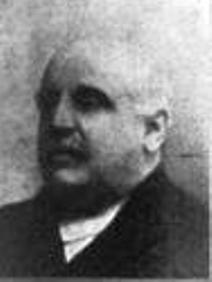Otto Arendt
Otto Arendt (born October 10, 1854 in Berlin ; † April 28, 1936 there ) was a German publicist and free-conservative politician.
Life
Arendt came from a Jewish family and later converted to Christianity. After attending grammar school, he studied law and political science in Leipzig and Freiburg . He received his doctorate as Dr. phil.
With his writing "The contractual double currency" from 1880 he got a connection to the movement for bimetallism. In the dispute between supporters of a gold or silver currency, Arendt advocated a dual currency based on gold and silver. This should be based on international treaties and thus reduce currency fluctuations. In 1882 Arendt co-founded the "German Association for International Dual Currency". He also became the organization's secretary. He was also the editor of the association's publications. Arendt is considered to be the main theoretical representative of the bimetal movement in Germany.
Since 1886 Arendt belonged to the Prussian House of Representatives as a representative of the constituency administrative district Merseburg 5 (Mansfeld lake and mountain district) and from 1898 to the Reichstag for the free conservative party. He sat in both houses until the end of the German Empire in 1918. Between 1888 and 1898 he was Arendt's editor of the “Deutsche Wochenblatt”. The paper was the mouthpiece of the Reich and Free Conservative Party. Arendt was the enemy of all socialist endeavors, was an imperialist, proponent of naval armament and advocate of protective tariff policy . Ernest Hamburger describes him as the “most reactionary MP of Jewish origin”.
In particular, Arendt campaigned for colonial policy since 1885. He was co-founder and secretary of the "German Emin Pascha Committee." The aim of the committee was to compete with English efforts to come to the aid of the researcher Eduard Schnitzer ("Emin Pascha") who was active on the Upper Nile . In 1889 the organization equipped an expedition led by Carl Peters . Arendt was also a founding member of the German Colonial Society and board member of the Pan-German Association . He was one of the few people of Jewish origin who joined this anti-Semitic organization. He also played a leading role at times in the Ostmarkenverein .
Arendt did not take an aggressive stance towards France, but in 1892 even spoke out in favor of a Franco-German alliance for reasons of usefulness. In 1907 Arendt was one of the most resolute opponents of the Bülow bloc .
In 1893 he married the actress and reciter Olga Morgenstern .
Arendt was the author of numerous economic and political writings. He was also a co-founder of the Verein für Socialpolitik .
After World War II he joined the anti-Semitic DNVP and changed only after the Kapp Putsch to DVP .
Works (selection)
- The silver enquete. An argument with Ludwig Bamberger . Berlin: Walther, 1894. (Digitized edition at: urn : nbn: de: s2w-7261 )
- Mr. President of the Reichsbank Dr. Koch and the currency issue. An answer to the manor house speech by Dr. Koch from May 16, 1895 . Berlin: Walther, 1895. (Digitized edition at: urn : nbn: de: s2w-8105 )
literature
- Otto Arendt , in: Ernest Hamburger : Jews in public life in Germany: members of the government, civil servants and parliamentarians in the monarchical era. 1848-1918 . Tübingen: Mohr, 1968, pp. 347-350
- Jakob Baxa : Arendt, Otto. In: New German Biography (NDB). Volume 1, Duncker & Humblot, Berlin 1953, ISBN 3-428-00182-6 , p. 345 ( digitized version ).
- Minutes of the Prussian State Ministry Volume 10 p. 374 Digitized version (PDF; 2.9 MB)
- A. Plate: Handbook for the Prussian House of Representatives. Edition for the 20th legislative period. Berlin, 1904 p. 290
Web links
- Literature by and about Otto Arendt in the catalog of the German National Library
- Otto Arendt in the database of members of the Reichstag
- Otto Arendt's biography . In: Heinrich Best : database of the members of the Reichstag of the Empire 1867/71 to 1918 (Biorab - Kaiserreich)
Individual evidence
- ^ Mann, Bernhard (edit.): Biographical manual for the Prussian House of Representatives. 1867-1918. Collaboration with Martin Doerry , Cornelia Rauh and Thomas Kühne. Düsseldorf: Droste Verlag, 1988, p. 48 (handbooks on the history of parliamentarism and political parties: vol. 3)
- ↑ Thomas Kühne: Handbook of the elections to the Prussian House of Representatives 1867-1918. Election results, election alliances and election candidates (= handbooks on the history of parliamentarism and political parties. Volume 6). Droste, Düsseldorf 1994, ISBN 3-7700-5182-3 , pp. 434-437.
- ^ Jews in public life in Germany: members of government, civil servants and parliamentarians in the monarchist era. 1848 - 1918. Tübingen, 1968. p. 348 digitized
- ↑ Jacob Toury The political orientations of the Jews in Germany p. 230 digitized
- ↑ Toury p. 305
- ↑ Arendt-Morgenstern, Frau Olga . In: Sophie Pataky (Hrsg.): Lexicon of German women of the pen . Volume 1. Verlag Carl Pataky, Berlin 1898, p. 16 f. ( Digitized version ).
| personal data | |
|---|---|
| SURNAME | Arendt, Otto |
| BRIEF DESCRIPTION | German publicist and politician (free conservative), MdR |
| DATE OF BIRTH | October 10, 1854 |
| PLACE OF BIRTH | Berlin |
| DATE OF DEATH | April 28, 1936 |
| Place of death | Berlin |

